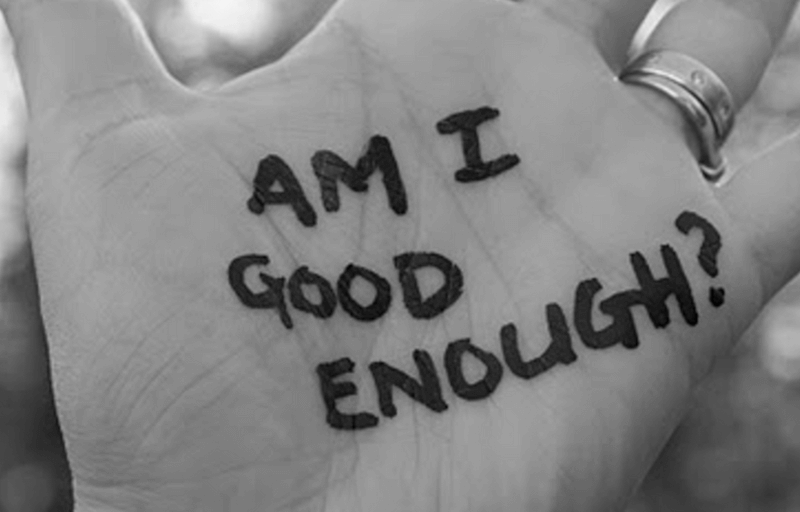Breaking Free from the Chains of Self-Doubt and Overcoming an Inferiority Complex

Have you ever felt so humiliated in the company of others that you were unable to speak up? It is not uncommon to feel inadequate, and insecure, and compare oneself to others. However, an inferiority complex sets in when these thoughts consume you to the point where you no longer have any confidence in yourself.
The Inferiority Complex: What Is It?
A psychologist named Alfred Alder coined the term “inferiority complex” in 1907. The overwhelming sense of inferiority, weakness, and insecurity that characterises an inferiority complex. When compared to other people, you believe that your achievements, attractiveness, and enjoyment all fall short. Thinking negatively about yourself all the time is a harmful mental and social habit.
You tend to think poorly of yourself. You’re constantly angry at yourself and your state of health. You are having trouble managing your life due to a lack, actual or imagined, of physical or mental resources.
Lack of Confidence
The current name for what was formerly known as an inferiority complex is chronic low self-esteem. The following are symptoms of persistently poor self-esteem:
- Lack of self-assurance and chronic underestimation
- Constantly being confronted by your imperfections
- Rejection of constructive feedback
- Aversion to public scrutiny
- Constantly evaluating oneself about others
- Anxiety and insecurity caused by the high expectations you set for yourself
The Two Major Categories of Low Self-Esteem
It’s important to distinguish between fundamental inferiority and secondary inferiority complexes. Each is defined below.
First-order Deficiency
This feeling of being below par begins in early life when parents start making comparisons between their offspring. Children are highly perceptive and listen carefully to their parents’ advice. A child’s self-confidence and sense of worth can be damaged by repeated criticism that they are weak and incapable. Their mature relationships would suffer as a result of their persistent feelings of inferiority.
Secondary Deficiency
When an adult fails to achieve success despite having the necessary skills, they are suffering from secondary inferiority. Low self-esteem is a symptom of secondary inferiority in adults. They have a hard time mingling with others. They feel incapable of sustaining meaningful connections with other adults.
Warnings of a Low Self-Esteem
Inferiority complex symptoms include the following:
- You’re perpetually down in the dumps, never motivated to improve your situation.
- Your sense of self, your sense of worth, and your confidence are all quite low.
- You are feeling helpless or emotionally fragile.
- Motivation is low for you.
- You have a lot of concerns, anxiety, and feelings of inadequacy.
- You regret your decisions and deeds.
- When other people make negative comments about you, it hurts.
- You are unable to make decent eye contact.
- You tend to speak in a gentle, low voice.
- You constantly downplay your strengths and achievements.
- It’s difficult for you to praise yourself.
- Your sleep schedule is erratic and poor.
- You have no luck maintaining any kind of connection.
- You try to get people to pay attention to you by acting sick or aggressive.
Why Do Some People Have a Feeling of Inadequacy?
Many things can go wrong that lead to a person having low self-esteem. A person’s upbringing and genetic predisposition are the two things that everyone shares. The remaining variables are as follows:
- Anxiety, despair, stress, abuse, and traumatic past
- Self-failure can be the result of depression and an inability to set and achieve achievable goals. The very act of expecting to fail can lead to that outcome.
- Having members of your family that suffer from this type of mental illness
- Avoidant personality disorder (AVPD) and borderline personality disorder (BPD) are two examples of serious mental illnesses. (BPD)
When trying to pinpoint what exactly triggered an inferiority complex in a person, it’s vital to look at their upbringing. Fear, doubt, and uncertainty are all things likely to emerge in children of stressed-out parents. Children from high-stress environments tend to have a lack of self-worth and a hard time developing a positive sense of themselves.
An inferiority complex can have several potential causes, some of which are external, such as peer pressure. Negative social media encounters and harassment from classmates, coworkers, and lovers are strong predictors of the development of an inferiority complex.
Implications of Low Self-Esteem

Your life will be severely impaired by your inferiority complex. You’re not able to do well in your personal life, professional life, or academic pursuits. You tend to give in to your partner’s wishes in romantic relationships, even if it means putting your wants and needs on the back burner. These workers don’t like to be recognised for their efforts, skills, and success. This prevents them from advancing in their career or earning a higher salary.
People who have a strong sense of inadequacy are more likely to consider suicide. People with an inferiority mentality may experience strong suicidal ideation, according to research. They weigh the option of suicide against the pain of continuing to live.
Complexes of Inferiority and Superiority
Having a superiority complex means that you consistently believe that you are superior to other people. It’s when someone overstates their value, skills, and successes. An overcompensation for an inferiority complex is a common source of superiority complexes. As a result, these two structures share common ground. However, a superiority complex sufferer is quite helpless and vulnerable on the inside.
This becomes a way for them to avoid confronting their inadequacy and thus serves as a coping mechanism. Their sole means of coping and feeling good about themselves is to act superior to others.
Showing Indications of a Complex Regarding One’s Superiority
- You now have a lofty sense of worth.
- In a word, you are a pompous perfectionist.
- You are always praising yourself and your skills.
- Care for Psychological Illness
A feeling of inferiority is not classified as a diagnosable mental illness. A professional in mental health evaluation and treatment is necessary to determine whether or not an individual suffers from an inferiority complex. You need to know exactly what it is and what causes it if you want to receive treatment. Did your upbringing give you a sense of worthlessness? Or may mental illnesses like depression and personality disorder play a role?
Therapy
When dealing with mental health issues, therapy remains the best option. A therapist is someone who can evaluate your situation in depth, such as a social worker, psychologist, or counsellor. Professionals in the field of mental health can also map out a therapy regimen tailored to your unique needs.
It is possible that your insecurity stems from an anxiety disorder, in which case cognitive behavioural therapy (CBT), acceptance and commitment therapy (ACT), or dialectical behavioural therapy (DBT) would be beneficial treatments. (PBT).
To hasten one’s rehabilitation, therapy is utilised to combat negative beliefs and to introduce constructive alternatives. A therapist is crucial to your healing process. They’re the ones that formulate your treatment strategy and guarantee its efficient execution.
Medication
It is essential in addressing inferiority complexes to match the source and symptoms in appraising a person. No one-size-fits-all approach exists for dealing with feelings of inadequacy. Medication selection is condition-specific. If your inferiority complex stems from, say, anxiety, your therapist may suggest antidepressants or anti-anxiety medication. If the inferiority complex is unrelated to mental health, then medication is not necessary. Instead, people can benefit from brief psychotherapy in organising their ideas and behaviours.
Do I Feel Down on Myself Because of It? When Will I Get Over This?
Getting over a feeling of inadequacy is a process that requires time, effort, and patience. If you’re looking to get over your feelings of inferiority, try these methods.
Reflection and Writing
Keeping a journal is an excellent method for coping with feelings of inferiority. You can keep track of your emotions and get to the bottom of the problem in this way as well. This is a terrific place to begin, and it may prove useful as you move forward with therapy. If low self-esteem is making you uneasy, take it easy and centre yourself. One of the best ways to unwind and concentrate on oneself is through meditation.
Affirmations
It’s high time you stopped caring what people think of you. You must treat yourself with kindness daily and refrain from making unfair comparisons to others. Be encouraging to yourself from the moment you open your eyes in the morning.
Be Around Upbeat Individuals
Boost your confidence by spending time with supportive friends and family. When you have supportive friends and family around you, it’s easier to forgive and move past your mistakes.
Concluding Remarks
Many people struggle constantly with feelings of insecurity. There’s no need for you to wallow in despair. Recognising that you have a problem and then getting expert help is essential if you want to get better. The professional therapists and counsellors at Changes Rehab in JHB are here to listen and assist you in identifying the origins of your insecurities. You need not wallow in the shame of your inadequacies and show yourself some affection. If you want to improve and get out, you can.



